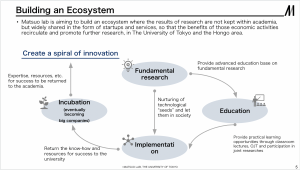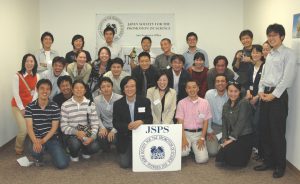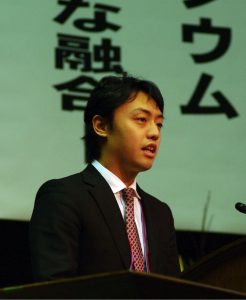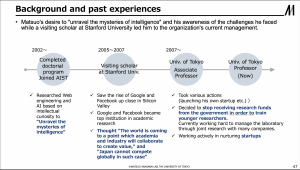Basic research is the origin of all activities of the Matsuo-Iwasawa Laboratory (hereinafter called Matsuo Lab).
This interview will share Professor Yutaka Matsuo’s thoughts on basic research and is divided into Part 1 and Part 2.
Part 1 will focus on Matsuo Lab’s vision, Professor Matsuo’s awareness of the challenges facing academia in Japan, and how the current management of the lab was established.
This is Professor Matsuo’s message to those interested in joining our basic research team.
Making Hongo a place that rivals Silicon Valley
This message is for people with careers related to basic research. I feel that many people still do not know what Matsuo Lab is aiming for, so I would like to share a little more detail.
Research conducted in academia should not be limited to the research itself. It should spread throughout society to further advance research through startups and services. By doing so, the human resources, knowledge, challenges, and funds gained through such economic activities will return to the university and contribute to further research. At the Matsuo Lab, we are putting effort into implementing such an ecosystem at the University of Tokyo and Hongo (the surrounding area).
The Matsuo Lab is currently engaging in 4 activities: basic research, lectures, joint research, and incubation. However, we have a vision to create a spiral encompassing all of them by bringing universities, startups, large companies, and venture capitalists together. In this spiral, each stakeholder plays a role in accordance with their objectives.
Universities nurture human resources who will systematize and discover knowledge through research. Startups grow rapidly and make changes by identifying the needs of society. Large companies contribute to society while maintaining and developing large-scale businesses. Matsuo Lab’s vision is to realize an ecosystem where society as a whole becomes better through the mutual activities of each stakeholder, despite the differences in their purposes.

Figure: The ecosystem Matsuo Lab is aiming to realize
In basic research, it has been said that “money is secondary” and “research motivation is not about money” for a long time. My opinion on this topic is yes and no. Money is never the main motivation for university researchers, and history has proven the importance of activities based on intellectual curiosity. However, it is also true that such a system is positioned within the structure of the capitalist economy, and money is closely related to research activities such as the employment of each member and investment in the research environment.
In areas where society has high expectations, like AI, we need to respond to society’s trust in us fully. To achieve that, we need collaboration between academia and industry and to conduct R&D and human resource development. By doing so, basic research will not be limited to research but will be firmly linked to business. Building the future together as we receive financial and other support from the industry is necessary to build such a relationship of trust and exchange of human resources.
This is happening in Silicon Valley and GAFA. We need to think more carefully about the significance of the fact that Google (Alphabet) and Facebook (Meta) are the companies with the highest level of AI research and development in the world. If you secure funding and provide a good environment, it is only natural that the level of research will increase. At least for research on AI, the days when it was enough to stay in the lab and do research are long gone. We will not have a chance to stand out among other academic research unless we involve society.
As people in academia, we must accelerate basic research by providing value to society.
This is a bit off-topic, but I believe that Japan needs to improve at creating systems.
People often glorify the story of “individuals working hard to overcome challenges.” While that is a wonderful thing, I feel keenly that society must create a system that does not rely on individuals’ efforts but rather firmly supports their activities.
We are taking on the challenge of creating a system in Japan where researchers passionately engaged in cutting-edge research that will lead to social change can conduct their research and development without being bound by outdated restrictions and conventions. We also believe this will have a positive ripple effect on other players within the ecosystem.
The Matsuo Lab is gradually gaining recognition thanks to the mentioned activities aimed at realizing the ecosystem. However, all activities are still small in scale. I believe that if we continue to work hard on each activity, the ecosystem will accelerate and expand exponentially, and I dream that in 5-10 years, Hongo will be a place that can stand alongside Silicon Valley.
Matsuo Lab is working with this vision in mind.
Challenges in Japanese academia that Prof. Matsuo sensed through his experience at Stanford University
I wanted to implement a Silicon Valley-like ecosystem in Japan from my experience at Stanford University, where I studied from 2005 to 2007.
The environment at Stanford University was wonderful even back then. The closeness between academia and industry completely differed from what I had experienced in Japan. There were lectures on how to build a search engine from back in 2005, and courses teaching how to create iPhone applications were offered not long after the iPhone was launched in 2006. I was surprised by how practical the classes were at Stanford. In 2005, the Internet was still a thing for a few people and was completely peripheral to the industry as a whole. Search engines were a difficult technology, not something you would teach in a university course. I was shocked that they were teaching it in a lecture. On top of that, the lecturers were current employees at Google and Yahoo.
The structure was that companies nurtured the human resources they wanted at the university and hired those students once nurtured to be active (although some students started their businesses). I remember meeting university researchers at academic conferences and seeing them hired by Google and Facebook, which reminded me of the power of capital. I saw new services such as search engines being created on the vast campus of Stanford while cutting-edge research was being conducted, and I thought, “Japan can’t win against this.”
While I was conducting research using public data, Facebook used vast amounts of user data. Once a new algorithm was created, deploying it and testing its hypothesis on many Facebook users was easy. Their environment, including the size of the servers and the amount of data, was an order of magnitude larger in every respect.
At that time, I realized that the time had come for academia and industry to collaborate to create value and that the idea that the world would change if researchers conducted theoretical research only was a thing of the past. This was the original experience that led me to the vision described above.
I am convinced that this idea remains unchanged and correct to this day.

Picture taken during Prof. Matsuo’s study abroad experience at Stanford University during his study abroad period (front row, fourth from left) = provided by himself
Of course, it is by no means the case that technological innovation will advance only among industrial players such as Google and Facebook. People in industries who say that “university research is useless” often come back to us after a while and ask if there is any good research at universities.
Industry focuses on short-term commercial research, and academia promotes research from a long-term perspective and with intellectual curiosity as its source. Both are important players, and I believe creating a mechanism to produce good things for the world through mutual collaboration is necessary.
Launching a laboratory operation that does not rely on research funding from the government
After returning to Japan, I took various actions. I launched my own start-up company, and I often took members of my laboratory to Silicon Valley to have them experience the atmosphere firsthand.
I also made a difficult decision to stop receiving research funds from the government to operate my laboratory.
Unfortunately, it is undeniable that there is a seniority system of researchers when it comes to being selected for government research funding in Japan. Mark Zuckerberg created Facebook while he was still in school, and Google was created by Larry Page and Sergey Brin when they were 25. However, in Japan, people in their 20s and 30s are working on cutting-edge things, but the lack of achievements and other reasons makes it challenging for them to get attention.
I was 32 years old when I returned from Stanford in 2007. Although I might be able to get decent payment if I waited until I was 50, I never wanted to be the one to nip in the bud of future researchers in their 20s and 30s. Therefore, I decided to create an environment that would support their activities.

Prof. Matsuo when he was a chair of the Ethics Committee (2014)
After that, I began to take action, hoping to receive money not from the government but from companies that would sympathize with and appreciate the research conducted in my laboratory. We had a difficult time in the first year, receiving only 2 million yen per year from a company. This is one-twentieth of the research funds we have been receiving from the government. Through trial and error and with the advice of my seniors, I have finally figured out how to provide value to the industry through research and development. We can now establish a cycle in which we receive joint research and donations from companies to run our laboratory and use the funds to train future researchers.

(To be continued in Part 2)
【Profile】
Yutaka Matsuo
1997: received B.S. in Electronics and Information Engineering, Faculty of Engineering, The University of Tokyo
2002: Completed the doctoral program in Engineering at the University of Tokyo. Became Researcher at National Institute of Advanced Industrial Science and Technology (AIST)
2005: Visiting Researcher at Stanford University
2007: Associate Professor at Department of Technology Management Strategy/ Center for Structuring Knowledge/ Graduate School of Engineering, The University of Tokyo
2014: Co-Chair and Project Associate Professor, Global Consumption Intelligence Endowed Chair, Department of Technology Management and Strategy, Graduate School of Engineering, The University of Tokyo
2019: Professor, Artificial Engineering Research Center/Department of Technology Management Strategy, Graduate School of Engineering, The University of Tokyo.
Received the Best Paper Award from the Japanese Society for Artificial Intelligence in 2002 and the Makoto Nagao Memorial Special Award from the Information Processing Society of Japan in 2007.
In the Japanese Society for Artificial Intelligence, he was Editor-in-Chief from 2012-14, Ethics Committee Chairman from 2014-18, and Director from 2020-22.
Since 2017, he has been President of the Board of Directors of the Japan Deep Learning Association.
External Director of Softbank Group since 2019.
Expert member of the Council for the Realization of New Capitalism since 2021.
Specializes in artificial intelligence, deep learning, and web mining.

 日本語
日本語



